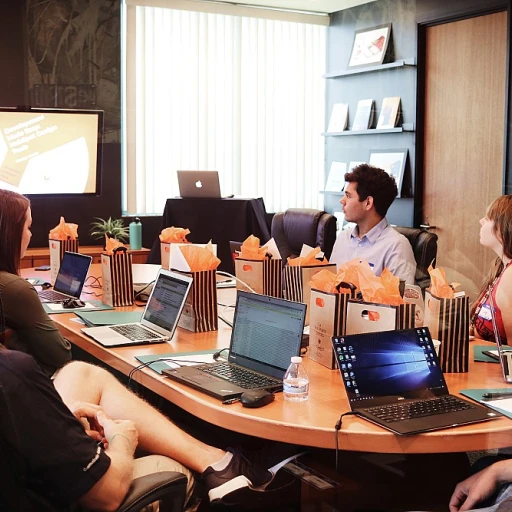
Understanding the Need for Reskilling
Embracing the Reskilling Revolution
In today's rapidly evolving world, the importance of reskilling has never been more crucial. With technology continuously reshaping industries, the demand for adaptable and skilled employees is skyrocketing. Companies and employees alike are recognizing the need to invest in continuous learning and development, ensuring a workforce capable of navigating the challenges of a dynamic economic landscape.
The education sector is responding with an increased focus on developing innovative teaching methods that cater to diverse learning styles. Educators are shifting from traditional models to more personalized and adaptive learning experiences, which engage students in ways previously unimaginable. This shift is crucial for maintaining competitive edge in a world where technological advancements redefine industry standards at a relentless pace.
Impact of Tailored Learning Experiences
The integration of tailored learning experiences, such as personalized learning and adaptive learning strategies, ensures that students are not merely passive recipients of information, but active participants in their educational journey. Such strategies promote critical thinking, collaborative learning, and problem solving, equipping learners with the skills needed for real-world applications. As adaptive learning technologies provide real-time feedback and data, educators gain insights into student engagement and learning outcomes, allowing them to refine their teaching strategies accordingly.
For businesses, staying ahead requires not just retaining talent but also reskilling employees to meet new challenges. This evolution calls for innovative assessment methods that accurately measure skills development and knowledge retention in real time, a topic further explored in our section on technological innovations in learning assessment.
For comprehensive insights on competency-based training, explore effective competency-based training methods and discover strategies that align with current reskilling needs.
Traditional vs. Cutting-Edge Evaluation Methods
Traditional Methods: A Time-Tested Approach
Traditional evaluation methods in reskilling programs have long been the backbone of educational assessments. These methods often include formal testing, examinations, and standard skill assessments. They are designed to gauge a student's progress through measurable data points and standardized metrics. This approach allows educators to evaluate knowledge retention and problem-solving abilities within set parameters. However, as the focus shifts towards developing employee skills for dynamic work environments, traditional methods alone might not suffice.Benefits of Traditional Evaluations
- Established Metrics: Traditional assessments provide a baseline for understanding student progress through quantifiable scores.
- Consistency: They offer consistency in evaluation, making it easier for educators to compare performance across different learning experiences.
- Benchmarking: Provide clear benchmarks for educational achievement, aiding in the comparison of development over time.
Limitations in Modern Reskilling Contexts
While traditional methods have their place, they can fall short in capturing the full scope of a student's learning capabilities. The modern workplace demands a more nuanced understanding of skills and competencies that align with real-time work scenarios.- Lack of Real-World Application: Traditional testing often lacks the context for applying learned skills to real-world problems.
- Limited Engagement: These methods might not maintain student engagement or cater to diverse learning styles.
- Low Adaptability: They aren't as adaptable to personalized learning paths that account for individual learning strategies.
Cutting-Edge Evaluation Methods: Meeting Modern Needs
As reskilling continues to evolve, educators are increasingly turning to cutting-edge assessment methods that leverage technology and innovative strategies. According to IGI Global, harnessing technology in education allows for adaptive learning approaches that cater to individual student needs.- Adaptive and Personalized Learning Environments: These approaches focus on aligning assessments with personalized learning paths, taking into account different student engagement levels, learning styles and critical thinking skills.
- Collaborative Learning and Feedback Loops: Cutting-edge methods often incorporate collaborative learning experiences and continuous feedback mechanisms that provide insights into the learning process, enhancing engagement and knowledge retention.
Integrating Traditional and Innovative Approaches
Blending traditional methods with modern technological innovations can create a comprehensive assessment strategy that ensures a more holistic evaluation of learning outcomes in reskilling programs. This approach can bridge the gap between standardized testing and the need for personalized, dynamic educational experiences. For a deeper exploration into unlocking the potential of innovative training methods, consider learning more about in-camp training.Technological Innovations in Learning Assessment
Technological Advances Revolutionizing Learning Assessment
The advancement of technology has brought forth groundbreaking methods for assessing education, paving the way for more dynamic and accurate evaluations. In the realm of reskilling, these innovations are not merely supplementary but are integral in adapting assessment processes to better fit modern training development needs. One of the foremost advancements is the utilization of real-time data analytics. By leveraging cutting-edge technology, educators and trainers can gather immediate insights into student engagement and performance during both in-person and online activities. This capacity for instant analysis is pivotal for identifying areas that require further attention, allowing for prompt adjustments in teaching methods to enhance learning outcomes. Adaptive learning technologies further highlight these innovations, creating a personalized learning experience tailored to individual learning styles and pace. This personalized approach enables a more refined assessment of student abilities and progress, moving away from the one-size-fits-all model of traditional assessments. Additionally, virtual and augmented reality are on the rise as tools for immersive learning experiences. These technologies allow for an interactive and engaging education framework, where students can apply skills in simulated environments. Such applications not only ramp up engagement but also offer educators unique strategies to measure practical skills and problem-solving capabilities effectively. Furthermore, the incorporation of gamification elements into educational content is challenging traditional assessment norms. By transforming assessments into game-like scenarios, students experience an engaging and motivating educational journey, while educators can track knowledge retention and critical thinking prowess more informally yet effectively. As technology continues to evolve, these edge innovations are expected to refine and reshape the way employee development is evaluated. Embracing these changes is crucial for staying at the forefront of educational strategies, ensuring that employees receive the evaluation and feedback needed to refine their skills in this fast-paced, ever-changing landscape. For more insights into the evolving landscape of assessments in education and https://www.reskilling-trends.com/blog/understanding-the-difference-between-competency-and-skill-in-reskilling, visit our detailed discussion on reskilling trends.Personalized Learning Paths and Their Evaluation
Crafting Individualized Learning Journeys
In the realm of reskilling, personalized learning paths have emerged as a pivotal strategy to enhance student engagement and knowledge retention. These tailored educational experiences are designed to meet the unique needs and learning styles of each student, thereby optimizing the learning outcomes. By leveraging cutting-edge technology, educators can create adaptive learning environments that respond to the real-time progress of students.
Personalized learning is not just about customizing content; it involves a comprehensive approach to teaching methods and assessment strategies. This approach allows educators to focus on critical thinking and problem-solving skills, which are essential for today's dynamic work environments. The use of data-driven insights helps in crafting these individualized paths, ensuring that each student receives the most relevant and effective training development.
Evaluating Personalized Learning Paths
Assessment in personalized learning is a multi-faceted process that requires innovative strategies. Traditional assessment methods may not fully capture the depth of learning experiences in personalized settings. Instead, educators are turning to adaptive assessment tools that provide a more nuanced understanding of student progress and engagement.
These tools utilize cutting-edge technology to offer real-time feedback, allowing both students and educators to make informed decisions about the learning journey. By focusing on collaborative learning and student engagement, these assessments help in identifying areas that need further development, ensuring that the educational content remains aligned with the evolving needs of the workforce.
As the landscape of education continues to evolve, the role of personalized learning paths in reskilling will undoubtedly grow. By embracing these innovative assessment methods, educators can better prepare students for the challenges of the modern workplace, fostering a culture of continuous learning and development.
The Role of Feedback in Modern Learning Evaluation
Feedback as a Cornerstone in Modern Evaluation
In the dynamic landscape of reskilling, feedback plays an indispensable role in shaping effective learning experiences. As technology continues to innovate, the ways in which feedback is given and received have undergone significant transformation.
Modern educational strategies emphasize the need for real-time feedback mechanisms that allow students and employees to adjust their learning paths swiftly. Utilizing cutting-edge educational technology, this immediate feedback loop aids in enhancing student engagement and improving knowledge retention. Adaptive learning systems personalize feedback, catering to diverse learning styles and ensuring that teaching methods are as effective as possible.
Furthermore, feedback is not limited to a one-way interaction. Collaborative learning environments benefit greatly from peer-to-peer feedback, allowing for critical thinking and problem solving to develop organically among learners. This collaborative approach strengthens skills and fosters a culture of continuous improvement.
- Technological Edge: The integration of data-driven insights into feedback processes means that educators can provide more accurate assessments, tailored to the specific learning outcomes of each student. Edge innovations have made it possible to track progress and adapt training development to the needs of individuals.
- Engagement and Motivation: Feedback, when delivered constructively, can significantly boost student motivation. It encourages an active participation in their own learning journey, transforming passive education into an engaging and interactive experience.
In the context of reskilling, the role of feedback is pivotal in ensuring that individuals not only acquire new skills but are also able to apply them effectively in real-world scenarios. By leveraging cutting-edge techniques in educational assessment, organizations can ensure that their employees stay at the forefront of their respective fields, equipped with the necessary skills to excel.













